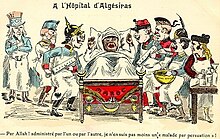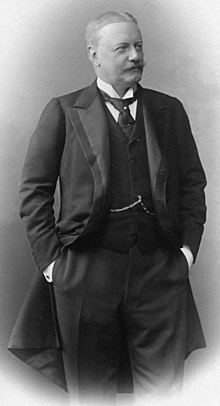First Morocco crisis
The First Morocco Crisis (1904–1906) was an international state of tension, triggered by the rivalry between France and the German Empire for influence in Morocco . France tried to establish itself as a dominant power factor in Morocco, while the German Reich insisted on giving all interested powers access to Morocco ( open door policy ). Although German politicians succeeded in getting an international conference through in Algeciras , Germany was isolated among the great powers . The Entente , the alliance between Britain and France, showed up against it consolidated. The final treaty of the conference was able to secure German economic interests; In fact, however, France had taken advantage of the crisis because it was able to expand its political power in North Africa.
prehistory
At the end of the 19th century, Morocco was largely spared direct colonization . It was not until 1880 that the major European powers came to an understanding with the Madrid Convention for the contractual safeguarding of the “open door policy”. Finally, at the turn of the century , Morocco roughly resembled China's semi-colonial status. Its sovereignty was thus undermined by means such as treaty ports or consular jurisdiction. In addition to the old colonial power Spain, the most important trading partners included the British Empire (it was then the strongest sea power and world power and practiced splendid isolation until around 1902 ), but also France and, increasingly, the German Empire. Morocco has a Mediterranean coast east of the strategically important Strait of Gibraltar and a long Atlantic coast west of it; both together are about 1835 km long.
Interests in Morocco
When the reform-minded Sultan Abd el-Aziz came to power in Morocco in 1900, France attempted to expand its influence in North Africa from neighboring Algeria to the west. The long-term goal should be a French-ruled Maghreb . To this end, the Treaty of Madrid should largely be dissolved and Moroccan rule initially weakened in the border area with Algeria. The French Foreign Minister Théophile Delcassé recognized only a marginal problem in achieving his goals in the German Reich. Germany's political interests in Morocco were classified as very low, and it was hoped that a balance could be achieved through territorial concessions in other parts of Africa.
The German Empire, which signatory was the Madrid Agreement and thus have a say on future arrangements had, however, expressed only an economic interest in Morocco. Although the volume of trade was negligible, the Foreign Office was of the opinion that the German position as a great power would be best served if one continued to be present in Morocco in order to be able to generate one's own advantage here in due course. At the end of 1902, Franco-German relations would actually deteriorate because of Morocco. One reason for this is the growing German interest in the region. So a German "Morocco Society" was founded by Pan-Germans and the colonial society, which should create a positive mood for greater influence in North Africa. On the other hand, France demonstratively excluded the German Reich from participating in its talks with Italy and Spain. Even when Berlin learned of a Spanish-French partition treaty in autumn 1903, which benefited French interests in Morocco, Friedrich von Holstein limited himself to a cautious policy in the interests of the Emperor and Chancellor . In relation to the Spanish king, Wilhelm II completely rejected German territorial ambitions in Morocco in 1904 and only insisted on his claim to freedom of trade and consideration when granting rail concessions. The background to this was the will to find a compromise with France and to avoid further crises. In addition, Spain should be encouraged to reach good agreement with France on the Moroccan question.
The 1904 crisis
With the outbreak of the Russo-Japanese War in February 1904 and the conclusion of the Entente Cordiale between France and Great Britain on April 8, 1904, the European power structure fundamentally changed. With the Anglo-French colonial settlement, the free trade policy had apparently failed. In Wilhelmstrasse , consideration was given to how to react to the Franco-British rapprochement without losing political room for maneuver and being isolated in terms of foreign policy. After the heavy defeats of Russia in the summer of 1904 and the sharp tensions between London and St. Petersburg after the Dogger Bank incident (October 1904), Russia continued to become an interesting potential partner. Delcassé tried to keep Morocco away from any international tensions in order to cement the political status quo and prepare the pénétration pacifique (peaceful penetration) of the country towards partition. Against strong voices from the Pan-Germans and the Foreign Office in North Africa, Kaiser Wilhelm also continued to opt for a cautious policy. At the end of the year, despite French threats, Sultan Abd el-Aziz rejected a reform program put forward by Paris that was supposed to pave the way for a protectorate .
The 1905 crisis
At the beginning of the new year, the French ambassador in Tangier, Saint René-Taillandier, held new talks at the Sultan's court about the reform program. The fact that France appeared here as “European mandate” contributed to German distrust of French politics. But the new rejection of the reform requests, formulated with German support, also represented a snub to French ambitions. The germ of the crisis-ridden development had long been laid. After the failure of German alliance negotiations with Russia at the beginning of 1905, the international situation from Berlin continued to be viewed with concern (encirclement). The rejection of an alliance was perceived as a loss of prestige that had to be compensated. Chancellor Bülow therefore considered it necessary to take tough action against France, but was aware that this could hardly be done militarily. The Herero War alone, which began in January 1904, was relatively unpopular with the German public, it was also expensive and warned of another colonial adventure. On March 15, 1905, Bülow finally announced in the Reichstag that the Reich would take steps to defend economic interests in Morocco. Wilhelm II, who was skeptical about the project, was persuaded to make the politically desired visit to Morocco during his traditional Mediterranean voyage. This news spread rapidly internationally and the emperor was eagerly awaited. While German politics consistently endeavored to emphasize the continuity of Moroccan politics and the normality of visiting Tangier, Morocco became the venue for fundamental disputes between Germany and France.
Tanger's visit on March 31, 1905 was in and of itself without escapades on the part of the emperor. Although he was summoned in five telegrams by Bülow during his cruise on the Hamburg ship to show himself ashore, he hesitated on his arrival and was only persuaded to go ashore by Richard von Kühlmann , the German chargette who had come on board . So he met the sultan and climbed his Berber stallions like his companion . He only reacted briskly to the greetings of the French ambassador and further stated Germany's interests in free trade and the sovereignty of Morocco. However, these words were greatly exaggerated in the press (that is, published as much sharper than they were). These exaggerations became known in France as well and caused greater concern.
The Algeciras Conference, 1906
After the Kaiser's visit, the Foreign Office also became active and formulated the following guidelines for the Kaiser on German Moroccan policy:
- Renouncing territorial ambitions,
- Demand for economic parity and
- Convening of an international conference on the question of Moroccan reforms.
By convening a conference, you wanted to strengthen your own position. If France did not agree to a conference, it would place itself in the wrong under international law against the other signatory powers. But if it came to the conference, Holstein thought it highly unlikely that France would be able to maintain its position in Morocco against the vote of Germany and, as was expected, the US . As a result, France would have been demonstrated that, despite all bilateral agreements, there was no way around Germany and that the new possibilities of the Entente Cordiale would only be very limited. On the German side, the risk of war was deliberately calculated in order to pressure France to give in on the conference question. This was of course extremely risky because of the Franco-British rapprochement, since England assured me that it would support France directly or indirectly. Finally, the international conference took place from January 16 to April 7, 1906 at the Reina Christina Hotel in Algeciras , Spain. However, the calculation of German politics did not work out. Only the two-party partner Austria-Hungary supported the German Reich to the greatest possible extent. Although the general freedom of trade and the sovereignty of Morocco were formally recognized, France was given the concession that it could manage the Moroccan police and the state bank together with Spain . Thus France became Morocco's direct debt administrator. Tetuan and Larache came under Spanish control, Rabat , Safi , El Jadida and Essaouira fell to France , while police from both countries were supposed to monitor Tangier and Casablanca . The results of the conference were summarized in the so-called "Algeciras Act", which was signed on April 7, 1906. In it, neutral Switzerland received the mandate to appoint the General Inspector of the Moroccan Police and to have certain legal cases judged by its federal court.
Consequences of the first Morocco crisis
During and especially after the First Morocco Crisis, the German Reich was thus isolated internationally. The goal of ending Franco-British rapprochement was not achieved and the Entente Cordiale was consolidated. France actually took advantage of the crisis and continued to pursue its goal of colonial acquisition in Morocco. The tensions remained, which ultimately resulted in the Second Morocco Crisis .
Individual evidence
- ^ [Hirschfeld, Krumeich, Renz]: Encyclopedia First World War , Paderborn 2003, p. 699 f.
- ↑ [FV Parsons]: The Origins of the Morocco Question 1880-1900 , London 1976
- ^ [Andrew Christopher]: Théophile Delcassé and the Making of the Entente Cordiale , London 1968, pp. 138 ff.
- ^ [Peter Winzen]: Bülow's concept of world power , Boppard 1977, p. 231 ff.
- ^ [Jost Dülffer, Martin Kröger, Rolf-Harald Wippich]: Avoided wars. De-escalation of conflicts between the great powers between the Crimean War and the First World War , Munich 1997
- ^ [Pierre Guillen]: L'Allemagne et le Maroc de 1870 à 1905 , Paris 1967
- ^ [Dülffer, Kröger, Wippich]: Vermiedene Kriege , 1997, p. 559
- ↑ Ibid. P. 561.
- ^ S. Fischer-Fabian: Herrliche Zeiten , 1986 by Verlagsgruppe Lübbe GmbH & Co. KG, Bergisch Gladbach, new edition Bastei Lübbe paperback volume 64206, March 2005, p. 364
- ↑ [Dülffer, Kröger, Wippich]: Vermiedene Kriege , 1997, p. 564
- ↑ Becker, Krumeich: Encyclopedia First World War , p. 700.
literature
- Jost Dülffer, Martin Kröger, Rolf-Harald Wippich: Avoided Wars. De-escalation of conflicts between the great powers between the Crimean War and the First World War (1856–1914). Oldenbourg, Munich 1997, ISBN 3-486-56276-2 .
- Martin Mayer: Secret diplomacy and public opinion. The parliaments in France, Germany and Great Britain and the first Moroccan crisis 1904–1906. Droste, Düsseldorf 2002, ISBN 3-7700-5242-0 ( contributions to the history of parliamentarism and political parties 133) (also: Mainz, Univ., Diss., 2000)
- FV Parsons: The Origins of the Morocco Question 1880–1900 , London 1976
Web links
- The First Morocco Crisis (at the LeMO - German Historical Museum )




